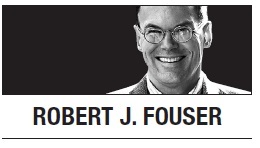Political junkies live for political campaigns, but the public easily tires and looks forward to a quick end. Though tiring, political campaigns bring attention to issues that have been festering, often for years.
The current presidential campaign has focused attention on two important issues: air pollution and urban regeneration. This is a good thing because both issues relate to the quality of the living environment in Korea.
The major candidates have all pledged to do something about the worsening quality of air in Korea. Campaign promises are often full of hyperbole and short on details, but promising to do something about the issue is a huge step forward. For years, the Korean media framed air pollution as a Chinese problem that blew over to Korea. This effectively absolved Korean politicians of responsibility, and they responded by ignoring the topic.
The issue came to the fore this year because of headlines declaring the air in Seoul as among the worst in the world. People instinctively know that the quality of air has gotten worse and that the length of the annual dust season has gotten longer. People worry about how the dust affects their children and their elderly parents as they curtail outdoor activities because of the dust.
The new interest in the issue raises the question of what a president can actually do about the problem. The easiest way to deal with the environment is to regulate economic activity. The Korean government has frequently used the power of regulation to direct economic behavior and social development. New regulations bring complaints, but businesses and consumers adjust over time.
Domestic-generated pollution comes mostly from the burning of fossil fuels, so the government could restrict automobile use and power plants that burn fossil fuel. In the 1990s, the government restricted automobile use because of traffic and the 1997 economic crisis, so there is a precedent to do so. People would complain about the inconvenience, but would adjust. Increasing the tax on gasoline would reduce automobile use, but would be more unpopular than a rotating ban on car use.
Generation of power from fossil fuel power plants could be cut if people used less electricity. During the 1980s when brownouts were still common, Korea was serious about conserving energy, but interest declined as electricity production increased and the standard of living rose.
After the massive earthquake in Fukushima in 2011, Japan was forced to cut its electricity use drastically after the government closed all nuclear power plants. Street signs and decorative lighting were turned off as the need for conservation hit home. Korea could adopt strict conservation measures to save electricity, which would help reduce reliance on fossil fuel power plants. This might be an inconvenience to some, but most people would accept it if it helped to improve the air.
Several of the presidential candidates have been more specific on the need to deal with widespread blight in older areas of cities. Many of these areas were moving toward redevelopment into apartment complexes, but many plans have canceled recently as redevelopment becomes less profitable. During the long process of redevelopment, the areas were allowed to deteriorate and they have become populated mostly by the poor and the elderly.
The easy way to deal with the problem is to throw money at it. Korea has a long tradition of investing in infrastructure, so a massive building project would be the natural approach. That would help the physical environment, but it would do little to help the poor and elderly residents who would be displaced. Many of them are renters who are often forced to move far out of the city when demolition begins.
As the working age population continues to decline, the Korean government will see tax revenues decline and expenses rise. This will make it increasingly difficult to throw money at problems. The government can use regulatory power to deal with pollution, but that policy would be more effective if it invested in renewable energy technology at the same time. That investment could help Korea become a leading exporter of renewable energy technology at a time when the world needs it most.
Throwing money at urban problems, by contrast, is backward-looking middle-class welfare. It does little to improve economic competitiveness and does little to improve the lives of the poor who are displaced in the process. The best way to deal with decaying cities is to encourage small-scale private investment in renovation and new construction.
By Robert J. Fouser
Robert J. Fouser, a former associate professor of Korean language education at Seoul National University, writes on Korea from Pawtucket, Rhode Island. He can be reached at robertjfouser@gmail.com. -- Ed.





![[From the Scene] Monks, Buddhists hail return of remains of Buddhas](http://res.heraldm.com/phpwas/restmb_idxmake.php?idx=645&simg=/content/image/2024/04/19/20240419050617_0.jpg&u=20240419175937)
